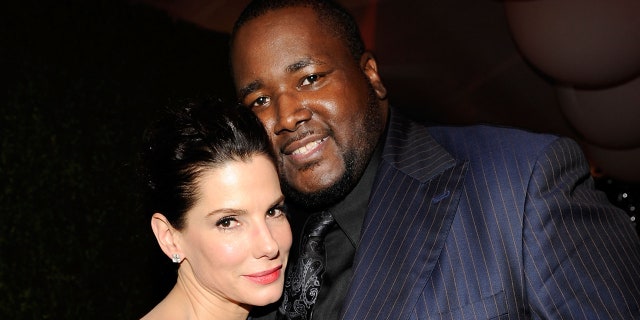

Hollywood is facing backlash over accusations it favors "White savior" movie plot lines as controversy continues to emerge regarding the 2009 film "The Blind Side."
Former NFL player Michael Oher, the inspiration behind the Academy Award-winning film, has alleged that he was never legally adopted by the Tuohy family and was tricked into a conservatorship that allowed them to benefit from his name and story financially.
Movie experts and liberal journalists have claimed the film, which received numerous NAACP Image Award nominations and led to an Oscar win for star Sandra Bullock, is yet another example of the "White savior" trope, wherein the stories of victimized minorities are often told from the perspective of "heroic" White characters.
Speaking with the Los Angeles Times, former Los Angeles Film Critics Association President Claudia Puig said she was not surprised by the revelations about Oher’s story but rather that it had taken him so long to speak out.
MICHAEL OHER SAYS 'THE BLIND SIDE' DIDN'T PORTRAY WORK ETHIC PRIOR TO JOINING TUOHY FAMILY

THE BLIND SIDE, Sandra Bullock (right), 2009. Ph: Ralph Nelson/©Warner Bros./Courtesy Everett Collection (Ralph Nelson/©Warner Bros./Courtesy Everett Collection)
"The White savior elements in ‘The Blind Side’ are pretty egregious. That movie is self-serving and patronizing at best and racist at worst," she said.
Puig also slammed Hollywood for positioning themselves as progressive champions for minority rights while often dampening the voices of those they claim to represent and hoped Hollywood would avoid these types of "wince-inducing" films in the future.
"Hollywood likes to present itself as being this open-minded, liberal place," she said. "But there are White people at the top making these movies and not realizing the more insulting aspects of what they’re doing. Or they just don’t care."
LA Times senior writer Greg Baxton noted that while more recent uproar surrounding films like "Green Book" may have "slowed the White savior wave," the entertainment industry "shows few signs" of outright abandoning the trope.
MICHAEL OHER CONSERVATORSHIP CASE RAISES MORE QUESTIONS THAN ANSWERS, LEGAL EXPERT SAYS

Former NFL football player Michael Oher, whose story became the inspiration for the Oscar-nominated movie "The Blind Side," signs books at an event for his new memoir at a store in Baltimore, Monday, Aug. 21, 2023. (AP Photo/Stephen Whyno)
"Projects featuring ‘White saviors’ are overwhelmingly produced by White filmmakers, who are usually motivated by a desire to condemn racism and often inspired by true accounts. By centering White characters, however, many such stories stifle their well-intentioned messages, if not counteract them entirely," he said.
A multitude of movies and television shows have been accused of perpetuating this trope, including "Lawrence of Arabia," "To Kill a Mockingbird," "Glory," "Dances With Wolves," "The Help," "Avatar," "Grand Canyon," "Amistad," "Billy Jack," "A Time to Kill," "Gran Torino," "Hidden Figures," "The White Shadow" and "Game of Thrones."
Veteran film critic Tim Cogshell took issue with the 1997 film "Ghosts of Mississippi," which told the story of an assistant district attorney Bobby DeLaughter, who investigates the murder of civil rights activist Medgar Evers. The film starred Alec Baldwin and Whoopi Goldberg.

Quinton Aaron of the "The Blind Side" holds a special place in his heart for Sandra Bullock, and has been disheartened by comments that the actress should lose her Academy Award for the film given the discourse between the real life Tuohy and Oher families. (Kevin Mazur/VF11/WireImage/Getty Images)
"I remember being a film critic and saying, ‘Somehow a movie about the murder of Medgar Evers winds up being about a White dude," Cogshell said.
Meanwhile, Clemson University communications professor Erin Ash slammed the 2018 Academy Award-winning film "Green Brook," which some critics claimed "spoon-feeds racism to White people" and includes "very little that can’t be described as crude, obvious and borderline offensive."
"We all believed we lived in this post-racial era," Ash said. "‘Green Book’ was an example of how these tropes are repeated because they resonate culturally."
While Braxton noted that Hollywood "may never decide to give up the White savior once and for all," he said these controversies show how changing "cultural mores" mean there’s a "potentially high price to be paid" for continuing to create similar content.
Oher revealed in filings that he was never legally adopted by the family – a revelation he claimed to have discovered in February 2023 after alleging that he was misled about the conservatorship, believing that agreeing to it would grant him some sort of familial relationship.
In the days that followed, more questions have been raised on both sides as the Tuohy family has denied all allegations, including that they used the conservatorship as a means to profit off Oher.
For more Culture, Media, Education, Opinion, and channel coverage, visit foxnews.com/media
Fox News' Paulina Dedaj contributed to this report.
